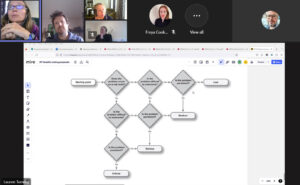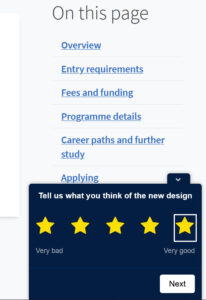Previewing the future degree profile: our beta launches
Last week we launched a preview of what undergraduate degree profiles will look like when the new system goes live. We call this a beta.
Our original plans were for us to have a fully working system for prospective undergraduates provision by now, which would be publicly available in March 2024. This was delayed due to circumstances beyond our control, but it has opened up the opportunity to launch this beta and learn from it.
My previous post on the project pause – May 2023
Beta web pages – what and why
We adopted the approach used by other public sector organisations like GDS to expose our work as early as possible. Working in the open is important as it enables us to find out how our approach works for intended users, and ensures that colleagues across the University had regular sight of our evolving plans.
Building up to the beta
Before we got to produce a beta product, we had multiple alphas. These prototypes were often generated very quickly, with the earliest versions not even existing as web pages. The initial concepts were generated in 2021’s design sprints. We worked up new digital service ideas rapidly with stakeholders and then tested with students. Each concept was developed and tested in under two weeks.
See a run through of our design sprint prototypes
Throughout our planning and development we’ve been exposing students and stakeholders to our latest assumption of the best digital service we can deliver. A big milestone was at the end of last year when, as part of an open invite session, Lauren talked through the undergraduate programme content model and a prototype built in the digital whiteboard tool Miro. This led to co-design sessions with schools who ultimately have helped us deliver degree profiles in the beta.
Write up of our December 2022 update event, including content model work
By the time we got to “real” software development in early 2023, we had a very good idea of what worked and what didn’t, and Lauren, Pete and the team were briefing our software developers with confidence.
The importance of usability testing
By February 2023 we had forecast that we wouldn’t have time to release a beta product, and had accepted we would have to settle for regular rounds of usability testing of the work-in-progress. This was due to the planned workload needed to get our new product ready by July.
Regular usability testing is something we could not compromise on, however. Regular testing is vital to the delivery of software that works for the intended user, and it brings the whole team closer to people interacting with their work.
Regular exposure builds empathy within the team for the students using the degree finders, and makes us better at our jobs. When we regularly see students succeed or fail when using features we’ve designed and built, we grow in confidence with the design patterns we see are working and have the opportunity to change things that don’t.
We have managed to do usability testing at least every month this year, bringing in stakeholders and developers at every opportunity.

Regular usability testing review sessions keep the team and our stakeholders closer to end users, and give us confidence in what we are building.
But usability testing involves a relatively small number of users, and focuses on what we want to learn about, not what they want to do. The beta opens new opportunities to learn about how users interact with our new pages.
Benefits of the beta
Being able to release a beta means that we can:
- leave people to interact with the pages; how they wish, when they wish and where they wish
- run analytics on the pages for a reasonably long period of time to learn from a much larger group
- undertake more natural usability testing sessions with live content fully integrated into the website.
Appraising the beta

Hotjar includes a rating and feedback system so we can learn from students’ experiences.
We have invested in an analytics package – Hotjar – to monitor user interaction with the beta programme pages and to collect feedback from users.
Hotjar has been implemented on top of what we already get from Google Analytics and gives us a new depth of insight into how users are interacting with the pages.
Hotjar gives us analytics data, heatmaps and videos of user behaviours.
Check out Hotjar features on their website
We have also implemented a feedback mechanism to enable students to rate their experience and tell us why. You’re welcome to provide feedback too, but it’d really help us if you identified that you’re a member of staff in your comment.
The beta web pages will be live until the UCAS deadline in January. At this point, content focus needs to change to the needs of offer holders and we will be preparing to ramp up the development project again.
The programmes involved in the beta
We published three preview pages for these undergraduate degrees:
- Chemistry BSc (Hons)
- French and English Literature MA (Hons)
- Veterinary Medicine BVM&S
We linked to the preview pages from the current degree finder presentation, with users invited to switch over to the new version. The links to these preview pages are no longer available.
Tell us what you think
Leave a comment or drop me an email. I’d really welcome your views.



